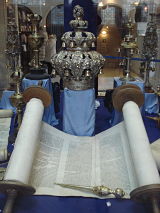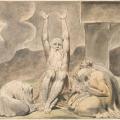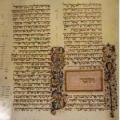168 - Chariot of Fire: Kabbalah
Posted on
The rich symbolism of the Zohar and the spiritual practices of Abraham Abluafia feature in the mystical movement known as Kabbalah.
Themes:
Further Reading
• M. Idel, Kabbalah: New Perspectives (New Haven: 1988).
• M. Idel, The Mystical Experience in Abraham Abulafia (Albany: 1988).
• G. Scholem, Major Trends in Jewish Mysticism (New York:1941).
• G. Scholem, Origins of the Kabbalah, trans. A. Arkush (Princeton: 1987).
• I. Tishby, The Wisdom of the Zohar: an Anthology of Texts, trans. D. Goldstein, 3 vols (Oxford: 1989).
Thanks to Jeremy Brown for his helpful advice on this episode!

Andalusia


 ..
..



Comments
Book of Splendor?
Another quibble: I think you referred to Sefer HaBahir in English as *The Book of Splendor*, a title which, as far as I know, is always used to refer to the Zohar.Thus, Gershom Scholem's book of selected passages from the Zohar is titled *Zohar: The Book of Splendor*.
In reply to Book of Splendor? by Berel Dov Lerner
Sefer ha Bahir
Hi there - Thanks for that note. I think I may have devised this translation myself on the basis that "Book of Brilliance" (a common translation) sounds awkward to my ear because of the unpleasant alliteration. I had forgotten that it creates a potential confusion with the Zohar. I guess the titles mean practically the same thing?
In reply to Sefer ha Bahir by Peter Adamson
roots
The root for bahir, BHR, implies a brightness like a flame is bright. It's specifically the light being indicated. Zohar's root, ZHR, implies an illumination. Metaphorically, to shed light on a subject as the word also can mean to instruct. In this word, it's more the effect of the light being emphasized. I believe they were meant to be similar, but they do carry different connotations.
In reply to roots by benAvram
Bahir
Right, the b-h-r root has the same meaning in Arabic. Anyway given the potential confusion I will translate it differently in the book version. Thanks again.
Kabbalah and Gnosticism
Why would the Kabbalists be interested in Gnosticism? As far as I know, they were a mainly a Christian movement (or rather a collection of movements). Further, how would they have known anything about them? The texts of the gnostics were lost until the end the of the 19th-century. It would be surprising indeed to suppose they were reading Irenaeus.
In reply to Kabbalah and Gnosticism by Zachary
Gnosticism in Kabbalah
Yes, that is a bit of a puzzle as was pointed out by Idel, but Scholem makes a good case for strong parallels. The idea would not be that medieval Kabbalists were reading Irenaeus' critique of the Gnostics - you're right that that is totally implausible - but rather that the late ancient Jewish sources of Kabbalah were already infused with ideas from Gnosticism so that it filtered into the tradition already at the start. Have a look at Scholem, Origins of the Kabbalah if you want to see the case for this.
Add new comment